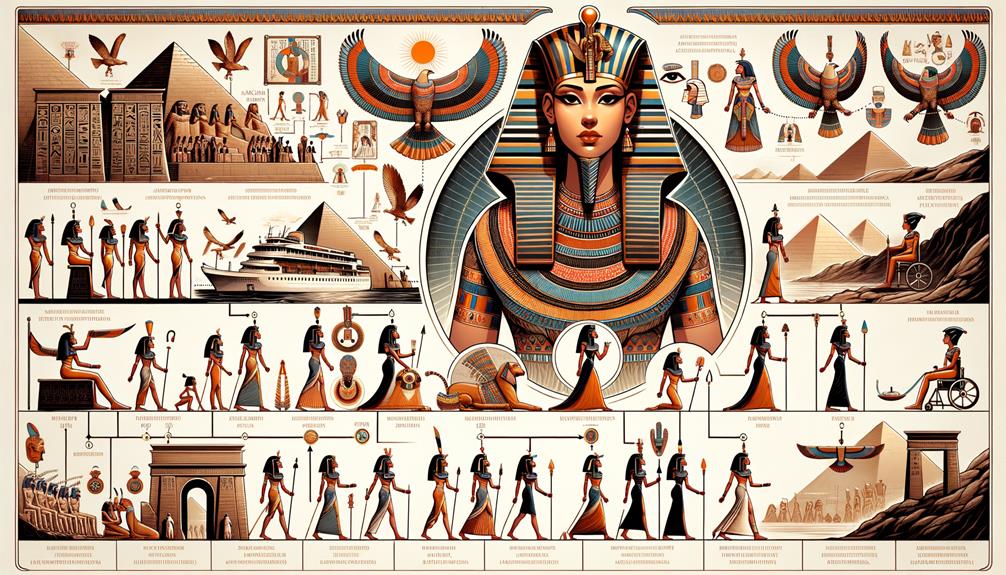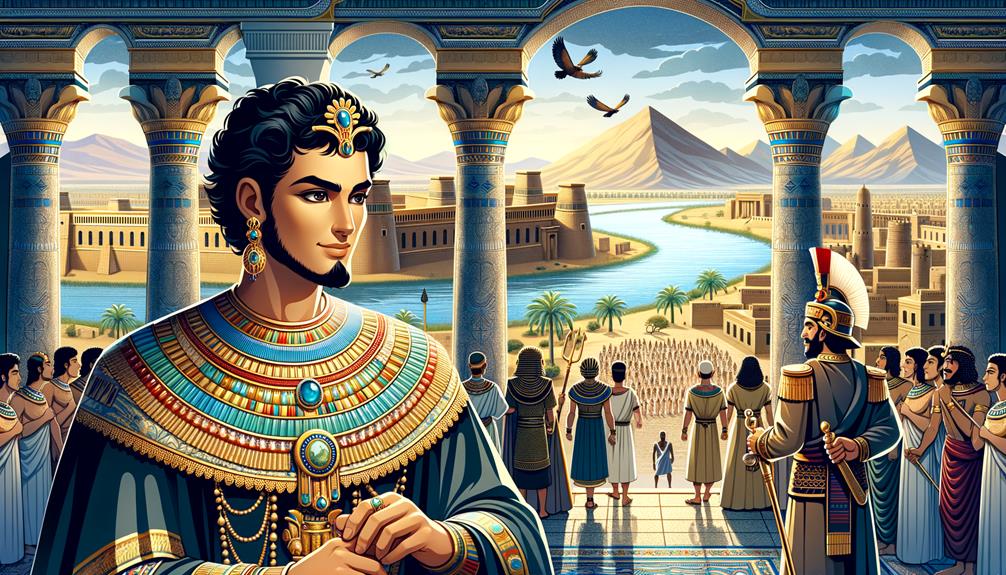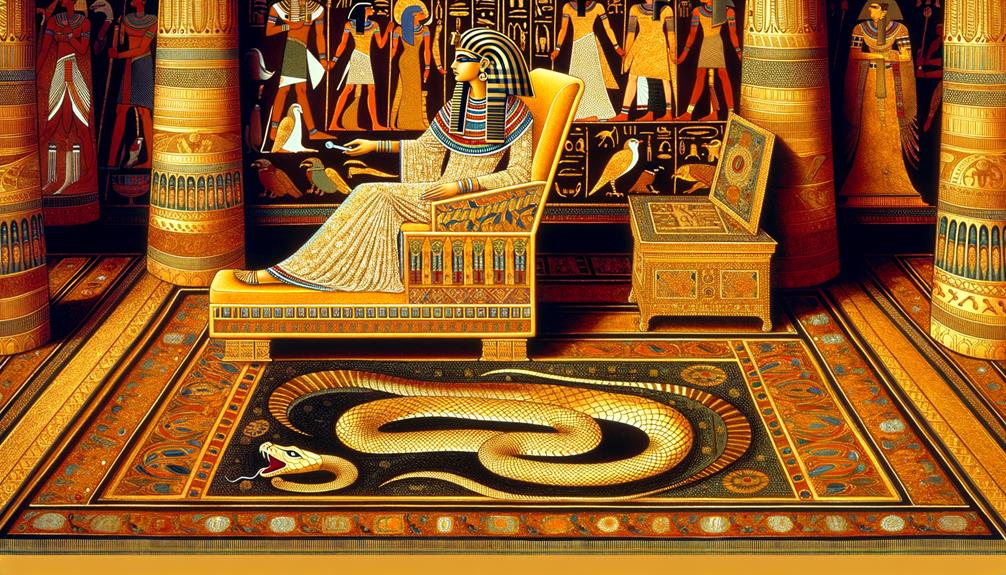Cleopatra, Egypt's final Pharaoh, is often depicted in pop culture as a romanticized and exotic character. However, I suggest we think of her as a shrewd political figure and planner, rather than just a siren. With my deep knowledge of ancient history, I've spent a good chunk of my life untangling the intricate stories revolving around Cleopatra, Egypt's last Pharaoh. Throughout this journey, I've uncovered a woman of profound intellect, political savvy, and powerful personal charm. She deftly handled a world full of ceaseless power battles to secure her lineage. Cleopatra had the ability to converse in multiple languages, rule a country, and hold her own in discussions with formidable Roman leaders. So, what caused her unfortunate downfall? And, if we remove the myths and legends, who was Cleopatra during her time? Come along on this exciting journey to find out who the real Cleopatra was, beyond the tales and folklores.
Cleopatra's Early Years

Cleopatra's birth in 69 B.C. marked the beginning of a rocky journey in the royal family. Her dad, Ptolemy XII, was caught up in a constant battle to hold onto his power, with Rome playing a major role. Egypt was a real minefield of politics back then, and everyone wanted the pharaoh's throne. When her father died, Cleopatra was thrown into this political whirlwind, having to fight her own brother, Ptolemy XIII, for the crown.
Things took a turn when Ptolemy XIII passed away, and Cleopatra ended up marrying her other brother, Ptolemy XIV, in line with their family tradition. But her quick thinking and smarts were about to be put to the test. Julius Caesar, the big shot from Rome, made his way to Egypt. Cleopatra, being the savvy politician she was, decided to join forces with him. This turned out to be a smart move because, with Caesar's backing, Cleopatra managed to reclaim her throne.
Before too long, Cleopatra had Julius Caesar's baby, cementing her ties with Rome even more. But things didn't stay peaceful for long. When her brother Ptolemy XIV died, it was Cleopatra's turn to step up as Egypt's sole leader. This marked a key moment in her reign and the history of ancient Egypt. It was these early years that shaped Cleopatra into the iconic queen we know her as today.
Rise to Power and Reign

Cleopatra, a woman of grit and determination, faced a challenging period in her life as she rose to power as the pharaoh of Egypt. Known as Cleopatra VII, she battled her brother, Ptolemy VII, for the ultimate seat of power. Her survival depended heavily on the Romans, specifically Julius Caesar, who played a crucial role in reinstating her as the pharaoh. They even had a son together, named Caesarion.
Another key figure during her rule was Mark Antony, with whom she had a significant alliance. They had twins, Alexander Helios and a daughter, adding another layer to her personal and political life.
| Close Associates | Offspring |
|---|---|
| Julius Caesar | Caesarion |
| Mark Antony | Twins: Alexander Helios and a daughter |
Cleopatra held the reins of Egypt for almost twenty years until she and Antony faced defeat at the Battle of Actium. This loss signaled her shift from a ruler to a figure of legend. Her death brought an end to her solitary rule and marked the transformation of Egypt into a Roman province, thus ending the Ptolemaic dynasty. Her life, a rich tapestry of politics, love, and tragedy, continues to captivate us as one of the most intriguing tales of ancient history.
Notable Relationships and Alliances

In the complex world of her reign, Cleopatra crafted alliances and relationships that had a substantial impact on her rule and history itself. Two of her most significant relationships were with Julius Caesar and Marc Antony.
As Cleopatra VII, she initially faced opposition from her own brother, Ptolemy VII, for the throne. But things took a turn when she formed an alliance with Julius Caesar, which changed her future and that of Egypt.
Let's talk about Cleopatra and Caesar. Their alliance was not only political but also romantic, resulting in the birth of a son, Ptolemy Philadelphus. However, when the Ides of March came around, Caesar was assassinated, leaving Cleopatra in a precarious situation.
Now, onto Cleopatra and Antony. Their relationship wasn't just an alliance; it was a partnership that was fueled by love, power, and shared dreams. This resulted in the birth of three children: Alexander Helios, Cleopatra Selene, and another Ptolemy Philadelphus. Antony's favoritism towards Cleopatra stirred up tensions that eventually led to war.
And then, there was The Battle of Actium. This battle marked the end of Cleopatra and Antony's alliance and the beginning of the Roman Empire. Their tragic love story continues to be a moving page in the history books.
The Battle of Actium

Let's take a look at the pivotal Battle of Actium, which took us all the way back to 31 B.C. This was when Octavian's troops went head-to-head with Antony and Cleopatra's combined forces. This battle was the boiling point of a civil war that had been simmering in the Roman Republic, all thanks to the power tussle between Antony, Cleopatra VII, the queen of Egypt, and Octavian.
Cleopatra, the last in line of the Ptolemaic rulers, decided to join forces with Antony, after the death of her earlier ally, Julius Caesar. Antony, who was the last son of Ptolemy VII, stood shoulder to shoulder with the queen against Octavian's Roman soldiers. They were hell-bent on defending their power, but destiny had plans of its own.
Turns out, the Battle of Actium was a smashing victory for Octavian. Antony and Cleopatra's forces sustained severe damage, and overwhelmed, they had no choice but to pull back to Egypt. Octavian, now the unrivaled power in Rome, chased after them.
This battle reshaped history. It signaled the end of the Ptolemaic dynasty, led to Cleopatra's heart-wrenching end and marked the start of Roman rule over Egypt. The fall of the queen signified the end of an age, the last pharaoh had been defeated.
Cleopatra's Mysterious Death

Cleopatra, the final ruler of Egypt, met a mysterious end on August 12, 30 B.C. This event still sparks curiosity and fuels debates among scholars. Some ancient writers, like Plutarch, suggest she may have committed suicide, while others point towards possible poisoning or a fatal bite from an asp.
To make sense of the mysterious end of Cleopatra VII, we need to consider three important factors:
- Cleopatra's political turmoil: The assassination of Julius Caesar and the subsequent civil war was a game changer. Cleopatra's alliance with Mark Antony didn't sit well with Octavian, leading him to declare war on her. Her defeat at Actium marked the end of her rule.
- The involvement of Egyptian priests: There's a theory that they called Cleopatra to Taposiris Magna, a temple rumoured to house an antidote for poison. Could this have been a setup leading to her demise?
- The fate of her children: Octavian let Alexander Helios and Cleopatra Selene live, but ordered the execution of Ptolemy VII, Cleopatra's son with Julius Caesar.
Cleopatra's demise signified a sorrowful end to the Ptolemaic dynasty. Her story still grips our interest, centuries later. However, the exact cause of her death remains an enigma, which adds to her ongoing fascination.
Frequently Asked Questions
Who Was the Last Great Egyptian Pharaoh?
So, you're wondering about the last impactful pharaoh of Egypt? Well, it's none other than Cleopatra. When we talk about her reign, it signifies the closing chapter of the Ptolemaic dynasty. She's renowned not just as a ruler, but also for her astute political strategies and the undeniable mark she left on Egyptian society, arts, and sciences. Her influence is still felt today, making her an iconic figure in history.
Who Ruled Egypt After Cleopatra's Death?
Following the demise of Cleopatra, it was Octavian who assumed the reins of power over Egypt. Later on, he took up the title of Emperor Augustus. This turn of events was a significant game-changer, signaling the finale of the Ptolemaic dynasty's reign and ushering in a new era of Roman governance over Egypt.
What Was the Last Pharaoh to Be Found?
You know, I've spent a good deal of time wondering about the identity of the last pharaoh that archaeologists uncovered. As far as I understand, the title goes to Pharaoh Psusennes I. You see, back in 1940, archaeologists stumbled upon his untouched tomb, which gave us some much-needed insight into Egypt's rather mysterious Third Intermediate Period. It's quite a captivating piece of history, don't you think?
Was Egypt's Last Pharaoh the Love Child of Caesar and Cleopatra?
Well, you might think that the last ruler of Egypt was the love child of Cleopatra and Caesar, right? That's not exactly accurate. Cleopatra did have a son with Caesar, and he was indeed named Caesarion. He was even named Pharaoh, but that didn't last long. His reign was cut short by his mother's death and, tragically, his own execution. So, no, Egypt's final pharaoh was not the love child of Caesar and Cleopatra.

